Music Reviews
A Concert for Bastille Day - Orchestra of KEMS Macclesfield
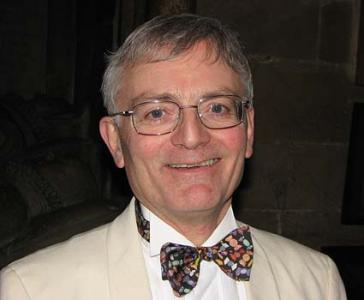
Trinity Church 14th July 2009
It is always pleasing to see performers such as the King Edwards Musical Society making the Buxton Fringe part of their annual programme. For this their fifth appearance at the festival, KEMS presented a concert celebrating Bastille Day.
They opened with Haydn's Symphony no 82, 'L'Ours', completed in 1786. This work is one Haydn's Paris Symphonies, commissioned by a Parisian concert society. Writing it as he was just three years before the tumult of the French Revolution, Haydn was no doubt aware of the growing unrest. The orchestra under conductor Anthony Houghton captured the varying moods of the different movements, from the triumphal bold opening of the first, the serene carefree moments of the second, the stately processional of the third, and finally the sense of something stirring and energetic crescendo of the finale.
Saint-Sa?n's Suite pour Orchestre Op 49 followed. I particularly liked the performance of the Romance with the expansive, fluid, yearning of the strings (under the able leadership of Alfred Barker) and the plaintive answering calls between the horns and flutes.
After the interval, we were appropriately summoned back to our seats by a trumpeted Marseillaise to new arrangement of Debussy's Suite Bergamasque. This famous piano composition has frequently been orchestrated; here it was arranged for woodwind octet by Wynne Harries. Though the performance lost cohesion and dynamic balance at times, there were moments showing the beautiful interplay that could be achieved between the different voices.
The final number was Mozart's Symphony No 31 in D 'Paris' K297, a piece commissioned by the same concert society as the Haydn symphony. The final movement was especially appealing with the orchestra capturing richness of the scoring: all the voices distinct but well integrated.
I'm looking forward to KEMS sixth annual appearance next year.
Barbara Wilson
A Way With Words - Nicholas Bennett & Christopher Ellis
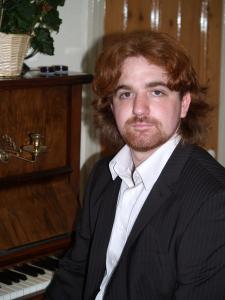
This was a duo of Nicholas Bennett - baritone and Christopher Ellis - piano. This was a celebration of great poetry in song, with some piano pieces in the second half.
The Methodist church was a suitable setting with excellent acoustics for this event. The event was well attended.
Nicholas opened the programme with a haunting acappella rendition of the folk song "O Waly Waly". He was then joined by Christopher for three songs from Shakespeare.
We were then treated to three german tales - my favourite was Erlkonig by Goethe, set to music by Franz Schubert, a moving rendition which demonstrated both the singers and the accompanist's skills.
There then followed three English love songs. To daisies was a lyrical number, followed by Yarmouth fair - full of energy and life.
After the interval we were treated to three Lieder set to music by Hugo Wolf. We then had an interlude with three piano pieces by Chopin, Gershwin and Liszt which gave Christopher a chance to demonstrate technical skill and interpretation.
The evening concluded with a five mystical songs by George Herbert set to music by Ralph Vaughan Williams.
These are two excellent performers who provided a most enjoyable evening and I hope we will see them again at the fringe.
Mike Rose
Acapella Jazz and Blues - Helen and the Lovenotes
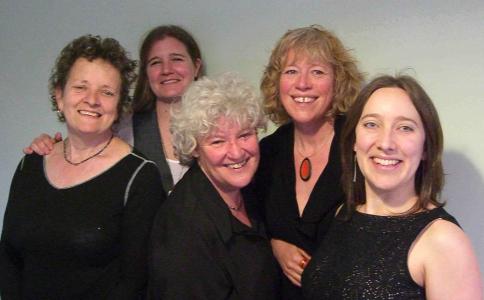
The Barrel Room, 14th July (and 16th and 21st)
This was the first of six shows Helen and the Lovenotes are doing this Fringe - and by the time the word gets around expect it to be standing-room only. This may be the feel-good gig of this year's Fringe.
Helen is Helen Watson a blues singer with a smooth and relaxed style who has been making music with top-flight musicians for 30 years and more. The Lovenotes are an acapella quartet based in Manchester who between them have years of experience and are held in the highest esteem by their peers. These are no novices then, this is a group of singers of the highest quality in total command of their material. The Lovenotes are Faith Watson, Jules Gibbs, Katherine Watson and Rose Hodgson.
At one stage they observed, "We're a sentimental lot and if you're under 35 you're going to be disappointed". It is true that much of their material draws from American song writing from the 1930s through to the 1950s and the set list included many standards: Ain't misbehavin', Stormy Weather, You don't know what love is, Nice work if you can get it, These foolish things. You get the idea. They treat the music and lyrics with respect - the arrangements are intelligent and make use of the range of voices but they know these songs are good enough to need no radical reworking.
They sang some songs that are a bit less familiar - Louis Jordan's There ain't nobody here but us chickens went down well; Nana was a suffragette would be known to many but few would have known that Jules Gibbs wrote it for the re-opening of Pankhurst House in Manchester. The newest song was a take on Imogen Heap's Hide and Seek, which, my daughter reliably informs me, was used in the TV series The OC. Helen sang a couple of songs on her own - including Bunny Berigan's I can't get started with you which was, apparently, a favourite of her dad's who had a 78 of the song which she sat on and smashed as a child. We were told more about their lives and families - including the fact that three Watsons are unrelated. There was that sort of friendly, chatty, relaxed atmosphere about the gig. They enjoyed themselves and you won't be able to help yourself enjoy it. Do yourself a favour and go at least once.
You can find out more about them, singing workshops and courses that they run, order CDs and much more at www.thelovenotes.co.uk
Keith Savage
An Evening with Africa's Lady of Song - Margaret Ferguson (soprano) accompanied by Jonathan Ellis (piano)
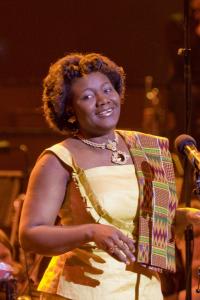
Buxton Methodist Church
This was another successful evening for Margaret Ferguson, known as 'Africa's Lady of Song'. Some people in the audience were from the Buxton area, but others had come some distance for the occasion, and we had travelled over from Manchester especially to see her and hear her.
The difference between Margaret and other singers is the sheer entertainment factor. As well as first-rate singing and a varied repertoire, Margaret brings warmth and fun to her performance. Her introductions to the songs and her conversations with the audience make the whole concert friendly and intimate. Everyone in the audience feels that they have got to know Margaret as a friend during the concert, and that she has sung for them personally.
This evening of music and song embraced a variety of styles, from the soulful spiritual 'Deep River' to Bizet and Hammerstein's rousing 'Beat Out Dat Rhythm On A Drum'. Margaret's pure soprano voice also enhances the best of modern popular music. Her soulful, soaring rendition of 'Wind Beneath My Wings' showed that the age and genre of a piece of music are irrelevant - music is either good or it isn't. She proved this point with her majestic performance of Puccini's 'O Mio Babbino Caro'.
As well as singing varied genres of music, Margaret did not just stick to the major European languages. She sang a traditional Ghanaian song, and also performed 'Calon Lan' in Welsh. Luckily, there was a Welsh gentleman in the audience to appreciate Margaret's mastery of his language.
Margaret was ably accompanied by Jonathan Ellis on the piano. While Margaret gave her voice a well-earned rest, Jonathan played two solo pieces. In the first half of the concert, he set the scene for Debussy's 'The Sunken Cathedral' - his playing truly evoked the magic and mystery of the piece. Then, in the second half, he rose to the challenge of a Chopin Scherzo and triumphed admirably.
After the official end of the concert, the prolonged applause persuaded Margaret and Jonathan to come back for three encores. As the audience began to leave the church, many of them chatted with Margaret and congratulated her on her performance. We drove back to Manchester uplifted and enriched.
Thank you, Margaret - here's to the next time.
Paul Berman
Anniversary Celebrations via String Quartet - Quatuor Deconet
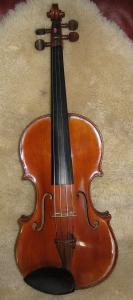
A clever programme for this talented quartet, Louise Latham and Nicola Bright (violins), Mary Anderson (viola) and Mary Dainton ('cello) based on anniversaries of composers ; 2009 has provided plenty of those. We began with some dances by Purcell who was born three hundred and fifty years ago. Actually Purcell never wrote any string quartets but the quartet gave us some arrangements for strings of well known pieces including spirited playing of the theme from the incidental music to Abdelazer which most know as the basis of Britten's Young Person's Guide to the Orchestra.
The next anniversary celebrated was Handel who died two hundred and fifty years ago. He never wrote any string quartets either. But the arrangement for quartet of the Hornpipe from the Water Music sounded eminently Handelian.
Haydn died two hundred years ago having left a large number of string quartets. The quartet chosen was one of Haydn's later works, opus 50, No 1, composed while he was still employed by Prince Esterhazy. Although supposedly stimulated by the quartets which Mozart had started to compose, this work is still essentially in Haydn's style and was clearly a favourite piece for these musicians.
The concert concluded with the quartet Opus 80 by Mendelssohn who was born two hundred years ago. Composed just before his death in 1847 it is a challenging work and not for the faint-hearted. Quatuor Deconet gave us a beautiful performance with particularly memorable playing of the lovely and melancholy adagio. It was almost as if Mendelssohn was bidding us all farewell.
P.L.
Are We There Yet? - Opera Larks and pianist David Barnard

Railway Hotel 17th 18th 19th July
On a thoroughly grey, wet and miserable Friday July afternoon what better way to pass the time than in the company of two fabulous singers, and an amazing accompanist.
On arrival you are met by the 'air hostesses' and the Captain and given instructions on what to do in case of an emergency during the flight! Once we had all joined in the emergency exits dance (aka YMCA) and the hostesses had ensured our seat belts were fastened - we were off.
The journey to Vegas is fairly eventful and takes us to various countries depicted by quick changes and songs we all associate with the country landed in. The eclectic mix of songs encompassed a lot of my favourites - America from West Side Story, La Vie en Rose, Carmen and even managed to make the old standard 'Danny Boy' uncheesy (if there is such a word!)
They coped wonderfully well with the very rickety staging supplied - and bravo for performing the Can Can. It was great to see that although there weren't many of us in the audience we were happy to join in and become part of the show.
David's role as various Captains is wonderfully underplayed unlike his accompaniment and solo rendition of 'Land of Hope and Glory'. - magnificent!
The glorious finale of 'Climb Every Mountain' is as excellent as it is hilarious.
Above all listening to the trained voices of Dawn Foxall (mezzo) and Diana Sharp (soprano), is a delight. The humour, showmanship and interaction with the audience of all three go to make a totally enjoyable experience and helped to dispell the unseasonal weather for a short while. Highly recommended.
Linda McAlinden
Celebrating the Cello: Music for Cello Ensemble - Celloscope
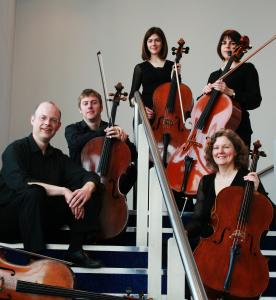
St James's, New Mills
A happy evening combining learner effort and professional ease to uplifting and cheerful effect - what more to ask of a Fringe event including children? Add to this that the effort is all to do with enthusing young cellists about performing the widest range of music, and playing with others, and it gets better. For one listener at least, a stage full of cellists of all ages is enchanting in itself, and the applause and comments suggested that I was not alone in this. The venue is an added pleasure, both in itself and as part of the spread of the Fringe outside the confines of Buxton - and the music was good, too.
Celloscope is a group of five cellists, all of whom are members or regular players with the Halle and BBC Phil orchestras, who play chamber music written or arranged for 5 celli, and also give workshops together. What the audience didn't see here was the full day of workshops preceding the concert, of novice cellists preparing for the evening, having about half an hour for each piece, which is not much time at all. The youngest player was 11, with a quarter sized cello, and it would be rude to guess the age of the oldest, there being adult novices as well. They had all concentrated hard all day, and concentrated probably even harder during the concert.
The learners played in small groups, so that everyone got a turn with a piece suited to their own level of ability, from beginner to Grade 6 (average, I was told, about Grade 4), with sometimes one of the professionals there to strengthen the line or hold it steady. I particularly admired the 'senior' group of three adults, willing to show their lack of skill because at the same time showing what skill they had gained. Some of these learners already have real control, and a beauty of tone that suggests there may be future professionals here, an exciting thought.
The five members of Celloscope also played together, a selection of pieces of very different kinds, a delight for the audience, and, more particularly, for their young participants, who were still and rapt for every note: (at one point my note says 'lilting and luscious'). Arvo Part, for instance, is not what you would expect such young people to appreciate, but they clearly did. The concert also included pieces for the full cello ensemble, few holds barred in the choice and difficulty of the music chosen, and all arriving together at the final destination. My abiding best memory will be of everyone playing a Bach arrangement, where we had sublime music, the joint endeavour in full swing, passages of lovely cello tone for addicts, and at the proper times, it danced.
These characteristics about sum up the pleasures of the evening, highly recommended for another year, should the group decide to do it for a third time, in the future.
Ursula Birkett
Classical Guitar Recital - James Rippingale - Classical Guitarist
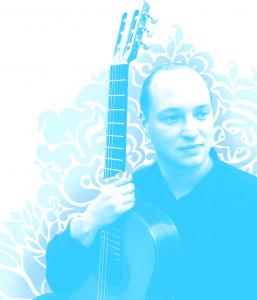
Christchurch, King Sterndale provided the perfect acoustic for the young guitar virtuoso, James Rippingale. It enabled him to exploit his technical mastery of his instrument from the delicate complexity of the work of American Composer, Lou Harrison to the dramatic contrasts within his own compositions; he explained in his excellent introduction to the three works of his own composition, that they constituted three-fifths of his output as a composer! His own work stands proudly beside the work of Villa Lobos, John Dowland and William Walton whose work he presented with technical mastery and compelling musicality.
He introduced each piece in the concert with a sincerity and insight that made the whole concert totally compelling.
Anyone who is after a true Festival experience should sample the work of this young man; there are several more opportunities in the next few days. If you have not yet chosen your event for tomorrow evening (Fri. 17 July) you should be sure to secure a seat in the Octagon, where he will play (for the first time in his career) the Rodrigo Guitar concerto with the Derbyshire Youth Orchestra: AN ABSOLUTE MUST !!! You will also find details of a couple of recitals in local churches in the fringe brochure.
Malcolm Fraser
Concert - Manchester Recorder Orchestra
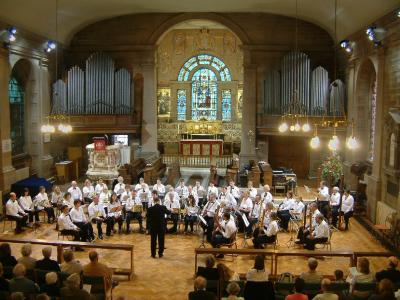
Trinity Church, Saturday 18 July
The Manchester Recorder Orchestra opened its 10th Fringe concert with Sousa's rousing Liberty Belle March which worked particularly well with the impressive contra and sub contra bass section covering the booming low section.
The centrepiece of the first half was a piece specially written for violin and recorder orchestra by Michael Sammons, Nocturnal on the name B.A.C.H. with Karen Stanhope swapping her descant recorder for violin. This was lovely, elegiac piece with a hint of melancholy, and at times moving.
Last up was Mozart's Eine Kleine Nachtmusik which started well enough but overall lacked pace and definition in places, especially in the middle and lower sections.
Boellmann's Suite Gothique opened the second half, written for organ this suited the orchestra which is effectively 30 or so individual organ pipes. The last movement, a Toccata, gave the tune to the bass section, with the sopranino and descants providing an eerie counterpoint.
The evening closed with Sinfonia for SRC played to mark the 40th anniversary of the SRC Stockport Recorder College, which was written by the founder of both the college and orchestra, Dennis Bamforth. This was a lively piece which allowed all sections a taste of the limelight, with varying degrees of success.
Conductors David Walsh and Ian Chesters provided entertaining and informative introductions to all the pieces. Martin Bisknell led the orchestra through some tricky pieces with aplomb.
This was an enjoyable evening of music making which was much appreciated by the audience. Once again the orchestra showed the potential versatility of recorder as an orchestral instrument, from the diminutive sopranino, through descants, trebles, tenors to the large bass section.
CJB
Critical Mass featuring Gilad Atzmon - Critical Mass with Gilad Atzmon!
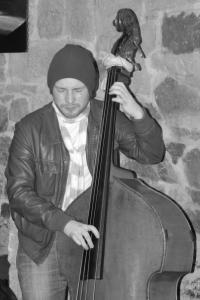
Beltane, 23 July
We don't get a lot of modernish jazz in Buxton and I'd been looking forward to this gig from the day it was announced. There is always the chance that the sense of expectation builds and eventually results in a feeling of disappointment. No worries, however. It was suggested to me that as a reviewer I needed to ask myself three questions: Can these guys play? Can they play together? Did I enjoy it? Unreservedly and emphatically the answer to all three questions was "Yes".
That a world-class player such as Gilad Atzmon should want to make the journey up to Buxton and play with a young quartet tells you a lot about what he thinks of Critical Mass. At the end of an evening of tremendously exciting music-making he made a point of saying "come and hear them at Beltane on Thursdays... they are the future of music." Do as the man says - it's unlikely that they'll be playing regularly in Buxton for much longer, their growing reputations will gain them work elsewhere. Critical Mass are: Emlyn Vaughan (bass), Al MacSween (piano), Graham Garside (guitar) and Eddie Hicks (drums). They seem to be an unassuming bunch of young men but clearly excited and delighted to be playing in front of their home crowd.
But what of tonight's music? Well, it was mostly standards - there hadn't been time to rehearse any complex, original compositions. The music, however, was anything but standard. Atzmon's style is intense, lyrical and torrential - someone said at the interval that they preferred a more mellow approach, but that would be like asking the sun not to shine. The point about his playing is that every note makes sense - and no matter how many notes he plays the sense of composition is evident.
Gilad Atzmon is an authoritative and compelling figure and in this environment was bound to dominate proceedings but he made a point of working with each of the quartet members - prodding, encouraging, making them do more.
One of the highlights was his duet with drummer Eddie Hicks - it might have been in Naima. Hicks has just graduated from Leeds and so can only be 21 or 22 I suppose. He is ridiculously talented.
Atzmon played alto all night - except for a clarinet introduction and solo for In a Sentimental Mood. Only in the finale, Caravan, did he hint at his trademark middle-Eastern sound. A full house asked for more but in over two hours of intense playing this quintet had given everything. Thanks to Beltane and Critical Mass for such a memorable evening.
Keith Savage
Dulcinea - Dulcinea
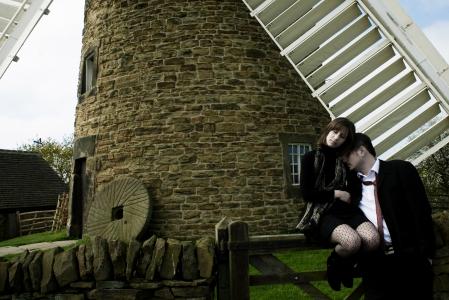
14th July
Having heard and seen Dulcinea at Fringe Sunday, I was looking forward to experiencing a full hour's performance - and I was not the only groupie there, other's had joined me too!
For those who missed them on Sunday, Dulcinea are a singer-songwriter duo (Alex Bowen and Ali Powers) based in Derby, who have had success in their solo careers, before coming together. Their music has fairly serious material - it is poetic, romantic, can be dark and tragic - but is communicated in a ballad style with carefully crafted melodies.
The musical quality cannot be understated - all vocals and harmonies were in tune, with well-balanced accompaniment on guitar and piano. The lyrics tell a story - so do listen carefully to them too.
Perhaps there could be more interaction with the audience, introducing the songs and explaining them too. This would create a less staged and more informal folk club style, which I'm sure, would make them feel more comfortable too.
So, a very enjoyable start to an evening - perhaps moving on to a play or comedy later would make a perfect night out. Don't forget to pick up a CD sampler on your way out (just £4).
You can also check them out on http://www.myspace.com/dulcineamusic where there are videos and tracks to watch, listen or download.
Let's hope they come back next year.
Martin Bisknell
Emma Hopkins - Emma Hopkins

What a charming 50 minutes we spent in the company of Emma Hopkins. This young singer-songwriter performed a repertoire of classic songs and her own, self-penned material with enormous conviction and enchanting simplicity.
Emma's background is in musical theatre, which unquestionably has informed her work as a solo performer, with its emphasis on clarity of lyric and truthful emotional content. Unlike many singers starting out today she avoids either artificial vocal gymnastics, or, when singing pop standards, simply aping the originals in karaoke-style copies. Instead Emma has found her own voice, with personal arrangements on the keyboard and an expressive vocal tone that moves from breathy intimacy to considerably more power. While her choice of covers could be said to be nothing new, she makes each of the songs very much her own. Likewise her own compositions are delightful pop ballads with a commendably unpretentious lyrical content that sits comfortably on her shoulders. I could easily imagine these songs being covered, in turn, by other pop acts.
Emma comes to life at the keyboard and when singing - perhaps with time she will develop her 'patter' between the songs, but hopefully not so much as to lose the natural quality that she brought to the proceedings. Here we have the beginnings of a considerable pop talent, one performing on her own terms, not through the reality show clone factory, but by being at all times, refreshingly, herself.
Robbie Carnegie
It Ain't Just Baroque - The Buxton Minstrels
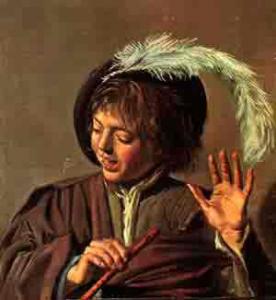
St Peter's Church, Fairfield, 10th July
This was pretty much a perfect evening of music-making; a bit like being invited to a big family party where everyone gets to play their favourite piece. Since it had that sort of feel it would be invidious to single out anyone. Central to the evening's music was a young string quartet and it was fitting that they opened. They chose Bach's famous Air from Suite No 3. A dangerous choice in some ways - since it is a piece that everyone knows -but it was delivered with careful attention to dynamics and tempo and sounded freshly minted. In the second half they seemed equally at home in a 'folky' Dvorak quartet.
Each of the quartet took the opportunity to show their individual skills; violinists Maddy Brown and Ailsa Hoyle thrilling in pieces by Telemann and Kreisler. If you have talent you should be allowed to flaunt it from time-to-time and both did. After the interval Miriam Brown played a movement from a Haydn Cello Concerto with sensitivity and control - she is just 14 and we can look forward to hearing her for years to come. Viola player Caz Sampson led a trio in two movements of a Mozart Divertimento. Delightful.
Three older - but young-at-heart - friends completed the Minstrels. We are lucky to have in Buxton two such skilled recorder players as Alison Bletcher and Martin Bisknell. They managed to include a variety of solos and duets on descant, tenor and bass recorders. Alison ended the first half of the programme with a concerto for treble recorder by Naudot in which she was accompanied by two violins and cello. The musical balance here was especially subtle.
In the second half of the programme Martin and Alison played a number of more recent jazz and blues compositions - including a hint of be-bop. Descant recorder may not be the most obvious blues instrument - it isn't quite dirty enough in tone - but the pieces were great fun to play and listen to.
The seventh member of the Minstrels was Andrew Cummings who accompanied on piano and harpsichord on many of the pieces. Andrew is not the sort to make a fuss but his willingness and ability to support sympathetically such a variety of music was crucial to the success of the evening, which came to a triumphant end with excerpts from Gershwin's Porgy and Bess.
Finally it should be added that it is an especial pleasure to hear music in St Peter's where the acoustic supports small-scale and bright music such as this so well.
Keith Savage
Keeping The Flame Alive - The Bronte Legacy - Bronte Legacy
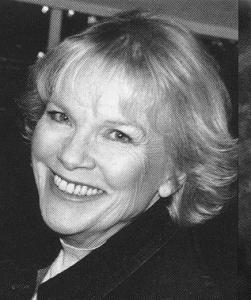
Buxton Methodist Church, Tuesday 21 July 7.30 - 9.30
The subject matter may seem an unusual topic for a musical tribute, but the style and content of this presentation brought history and literature alive in equal measure.
This is a great example of bold new writing; only at the end of the show were we told that this had been a "first performance". The audience were quite taken aback by this, having been captivated by the skill and professionalism of the cast.
So what is the "legacy"? Val Wiseman (Best British Jazz Vocalist 2008) took us on a journey through the lives of the Bronte children and their parents, painting a vivid and atmospheric picture of life and death at The Parsonage in Haworth. The focus was on Emily, Anne, Charlotte and Bramwell; Patrick Bronte (the father) was acknowledged clearly as providing a stimulating literary environment for his children (as well as a box or two of toy soldiers). The mother and two other sisters were mentioned, albeit briefly.
The lives and losses of this family were reflected in the lives and losses of characters developed in their poetry and from their novels. Brian Dee (composer of this original music and distinguished broadcaster and musician) took Val Wiseman's words and tied together the frustration in Agnes Grey, the duplicity of Blanche Ingram and the mixed emotions of Jane Eyre (along with many others) in a mesmerising musical score.
The commentary Val provided between the songs allowed easy access to the Bronte stories, even if you are not a fully qualified Brontephile. Her enthusiasm for the "Hidden Mysteries" of the enduring themes portrayed in the novels, art and poetry was more than enough to transport the audience to the Moors (and Brussels) on a rather wet Tuesday evening.
Taking a style of pure "cabaret" is where Val excelled. Her captivating stage presence and multi-layered interpretations were pure joy. Whether reciting Anne's poetry or making a social commentary on the reaction to increased industrial development and its impact on job opportunities, Val gave the themes a sharp, modern relevance. Moving between the "highs" and "lows" of the family fortune gave Val the opportunity to explore her full range of musical stage magic.
Accompaniment was by the Bronte Legacy trio (www.brontelegacy.com). It was clear that the trio shared the enthusiasm of Val and Brian for the themes being developed.
Overall this is a wonderful, fresh and entertaining tribute to the rich heritage of the Brontes, brought to us by some of the most accomplished musicians you are likely to find.
Jon White
La Traviata - full concert version - City of Manchester Opera
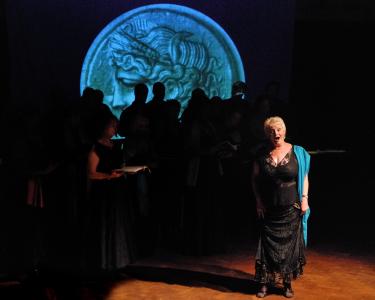
St John's Church, 11th July
The City of Manchester Opera (COMO) took Best Music award at the Fringe in 2008 and there was a big audience at St John's to see if they could repeat the performance.
La Traviata is a bold choice in some ways - one of the most-performed and best-loved works in the repertoire there is always the risk that you may seem to be just 'so, so'. As it turned out COMO's boldness paid off.
The stripped-down, concert approach was a good - if financially necessary - choice. Jonathan Ellis performed heroics at the piano driving the whole thing along and the absence of orchestra and sets meant that you had to concentrate on the voices and the music to tell the story.
COMO is very well-served by its principals. Louise Geatch commanded the action as Violetta and persuaded you that she was fascinating, flawed yet fragile. John Elliott, as Alfredo - Violetta's new lover - conveyed the right sort of tenderness, anxiety and (briefly) anger. David Palmer - as Alfredo's father, Giorgio - suggested determination to manage the affairs of his son by preventing his continuing a relationship with the courtesan, Violetta. His second act aria was delivered with great conviction.
The principals were well-supported by a strong, punchy chorus and other members of the cast. Chris Gill, as musical director, produced a performance that was tight, muscular but had spaces and places to breathe and reflect.
COMO hope to produce Carmen next year. All the evidence is that they have the musical resources to succeed again and we look forward to welcoming them to Buxton for a third year. If you missed La Traviata then there may be consolation in the knowledge that you can hear soprano Margaret Ferguson (Flora in this production) - accompanied again by Jonathan Ellis - at the Methodist Church on 17th July starting at 7.30 pm.
Keith Savage
Martin Hall and Guests - Martin Hall and Guests
Railway Hotel, 24 July
The Railway Hotel boasts one of the best rooms for gigs in Buxton, and was last night host to an album launch by Martin Hall along with slots from a selection of fellow songwriters and performers. Martin opened the evening himself, and slightly sheepishly admitted the album will be out in September. But he played enough tracks from it to show this is realistic and worth the wait. More on him later.
Second up was Lucy Spraggan. Although only just 18, she has a strong and confident voice, and has clearly been writing her own songs for some time. Her subject material is limited by her age, so will of course expand with time, and clearly related better to the army of friends and supporters that came to see her than the more mature members of the audience, but there is obvious talent and intuition in the way she goes about constructing a song. She will improve as a writer and as a performer, but this is meant as a compliment to her potential rather than a criticism of how good she is now.
A sharp contrast was provided by Coming Up the Pike (who told me they're changing the name soon, so may take a bit of finding) - a four piece with fiddle, double bass, guitar and banjo. Best described a 'old timer' music, they played a selection of tunes and songs with an American folk flavour. Although they've performed and played as smaller ensembles, the band has only been going five months or so. Despite this, they are extremely tight and have a very good sound: warm, rhythmic and natural. The group vocal work was excellent but perhaps a little low in the mix, and one or two of the singers strayed away from the microphone occasionally. Minor quibbles, though. It's a style of music you rarely hear, performed very skilfully.
Two more very young players (Joe Spraggan and Soz) sang a few covers and a few of their own. The highlight was a vocally dramatic rendition of Radiohead's 'High and Dry'. The harmonies and counter-melodies were brilliant, and the only criticism would be that the two guitars played too similar a role - it would work better if the accompaniment was more carefully arranged or if one guitar were cut altogether. The other performers were Ruby Moon (who sang Richard Thompson's 'Down Where the Drunkards Roll', backed up by some of Martin's best playing of the night) and Cathy Rymer, who has an ethereal voice and performed heartfelt, honest songs that clearly made an impact on the audience.
So, Martin himself. I have always regarded Martin as the best singer/guitarist in Buxton. He is clearly a musician - and a person - in a very different place than I have seen him before. A set that would have previously been dominated by covers now features very few (and those requests) in favour of his own songs. There is a simplicity and freshness where before things may have been elaborate and needlessly intricate. And he has turned away from the gloomier themes that perhaps dominated his previous performances. The highlight of the evening was 'Water on Stone', which reflected on misery from a position of real happiness: a light staring back along its tunnel. Bring on the album.
Nick Butterley
Men Diamler - Beltane

A late addition to this year's Fringe, but boy what an addition! This was the best act I've seen at the Fringe - ever.
I'd read reviews of shows but wasn't prepared for this. From a quiet start it soon rocketed up several gears and the audience was hooked. Joining in with the chorus of 'Life is a terrible thing' and stamping feet, and I mean stamping, this show was a joy for everyone there. The songs with titles such as Black Pudding River and Ten verses (as it has 10 verses) were wonderful. He held the audience whether walking around, sitting or trying to get up the chimney. And a voice of such power, he really didn't need a microphone.
In terms of style, well its sort of leftfield and clearly not mainstream - think Tom Waits, Nick Cave and Howe Gelb, and you're still not close!
It was one of those times where artist and venue were made for each other. I couldn't think of a better place to see this man. Simply marvellous!
There should also be a word for Elliott Morris from Lincolnshire who ably provided the support act. Elliott showed his mettle and is a really talented guitarist, its been a while since I've seen anyone play so well as this young man. He also wrote a song about playing Pro Evolution Soccer 2008. Nuff said.
Ian Heath
Mendelssohn & Bach - A Summer's Celebration - Manchester Chamber Choir

St John's Church
Buxton weather at its worst but we soon forgot that listening to the wonderful singing of the Manchester Chamber Choir making a welcome return to the Fringe after an absence of a few years.. This is a very well balanced choir whose entire programme was sung unaccompanied. But so musical is their singing that it often seemed as though there was accompaniment after all.
The first part of the programme focussed on Mendelssohn whose anniversary it is this year and also Bach whom Mendelssohn much admired. Much of the Mendelssohn was religious music including Sechs Sproche in eight parts which called for some highly disciplined singing. This was followed by Bach's motet Komm Jesu Komm probably written for a funeral but actually not at all sad, unlike modern memorials. And then a highlight, The Praises of St Francis composed by the conductor, Martin Bussey, for pilgrims going to Montserrat.
The second part of the concert was given to secular music including An Old Romance by Mendelssohn and works by nineteenth century composers Parry, Sterndale Bennet and Macfarren. They were once hugely successful but are now largely forgotten. The choir showed us how much worthwhile music is waiting to be re-discovered.
The choir took all the differing demands of the programme in their stride and we gained the impression that they were thoroughly enjoying themselves. Such enthusiasm is infectious and so the audience enjoyed themselves as well.
Peter Low
Moonlight and Music - Angela Rowley and James Pelham
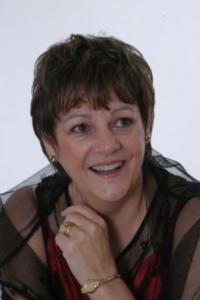
Although we make every effort to review shows at the Fringe, unfortunately this one slipped through the net. Please see Angela Rowley's website http://home.freeuk.com/angelarowley/ for further information. If anyone would like to write a retrospective review of the Buxton event please Send message To Info
Music for a Summer's Evening - British pianist David Schofield
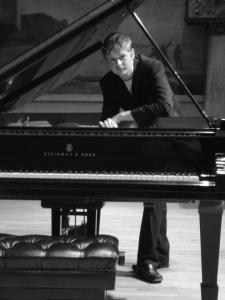
David Schofield arrived on the Fringe with a most impressive CV of past achievements. And we were not disappointed. Technically his mastery of the piano is formidable. It is not often that one encounters such astonishing keyboard pyrotechnics in somebody so young.
The main work was the Grand Fantasy on Gershwin's Porgy and Bess transcribed by Earl Wild the American pianist. The piece was created in 1976 and has become one of the most challenging of assault courses for pianists. But David tackled it with amazing assurance.
To show his versatility David had also played two sonatas, K 426 and K427 by Domenico Scarlatti, a number of short works from Brahms opus 117 and 118 and Chopin's demanding Etude opus 25 no 12. It was just the right programme for a summer evening when miraculously it was not raining!
P.L.
Music for Oboe and Guitar - Marios Argiros and Dimitris Dekavallas
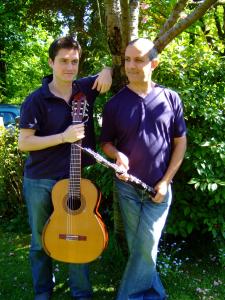
Wednesday 22nd July 1pm, Methodist Church
A delightful interlude of sunshine on a rainy afternoon in Buxton. It is a real sign of the Fringe Festival having come of age that musicians of this calibre are coming here. This is the second Fringe visit for Marios Argiros and Dimitris Dekavallas who performed a largely sunny programme with the possible exception of two pieces by Napoleon Coste. The pieces were, we were told, written after Coste had a serious accident that restricted him to composing and prevented him from playing. Perhaps that explained the more sorrowful note that this pretty music sounded compared with the jolly and passionate dances. We heard a global array of music from Rossini's Italian to Argentinean, Romanian and Brazilian dances, all expertly played by two Greek musicians.
Marios and Dimitris are clearly friends and enjoy playing together. In the high ceilinged church the clarity of the notes was crisp and clear. Such a shame only thirty people took the opportunity to enjoy such a refreshing treat in a venue that could comfortably hold 120. If you can make it, go and see them at St James the Less in New Mills on Saturday 25 July at 7:30pm.
Jean Ball
Music for Strings - Amaretti Chamber Orchestra

Over the years Amaretti have built up many supporters so it was a large audience that welcomed them back to the Fringe for a sparkling concert.
The programme opened with Tippett's concerto for Double String Orchestra. Composed just before the second world war it sits firmly in the English romantic tradition with melodies based on folk songs. The beautiful adagio with the leader, Mary Anderson, playing the solo part was excellently controlled and the result was quite magical.
Shostakovich's Concerto for Piano, Trumpet and string Orchestra, opus 35,formed the main work. Composed in 1935 before Shostakovich had been censured by the Soviet authorities it is actually a piano concerto with some solo work for trumpet ( Clive Scott) rather than a double concerto. In Sam Brook we had a veritable tiger of the keyboard which is what this work requires. It was a breathtaking display.
Finally the orchestra gave us Suk's charming Serenade for Strings, opus 6. Written when he was still studying under Dvorak who had suggested that he composed something cheerful. It is wonderfully romantic and lyrical; perfect for a Summer afternoon.
Louise Latham always brings out the best in the talented musicians who form the Amaretti and this concert confirmed again the high standard of her musicianship. It is sad to learn that she will be stepping down as conductor.
P.L.
Operatastic! The Accessible Guide to Opera - Relative Pitch Opera
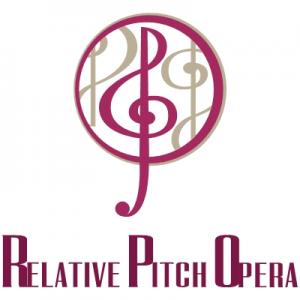
This a guide to the opera by Relative Pitch Opera, designed make opera accessible to all. To do this they have selected a number of famous arias and duets. This is interspersed with an explanation of opera and the pieces themselves. The acoustic in the Methodist church was excellent, a suitably dramatic setting.
The evening commenced with a piano introduction, followed by a short spoken introduction to opera presented by an actor, Katherine Oliver.
We were then taken on a journey through opera, with Katherine as our guide. The examples of operatic arias and duets were carefully selected to give a range of composers and styles. Katherine's commentary between the numbers provided easy access to the opera.
The highlights and arias were sung by Helen Leonard Soprano, and Terence Robertson, Tenor, with piano accompaniment by Carl Penlington-Williams. I particularly enjoyed the love duet from Madame Butterfly by Puccini. a moving rendition which demonstrated both the singers and the accompanist's skills.
Their excellent voices which could fill the church with ease and gave a clear feeling of the power, attraction and drama of opera.
In order to help the audience to relate to the operatic pieces, examples were demonstrated in song of the use of opera in soap opera, advertising and film.
This is a easy and enjoyable way for those who are unfamiliar with opera to learn about opera and enjoy some great arias and duets.
Mike Rose
Orchestra Concert - High Peak Orchestra
St John's Church
Over the years Andrew Hodkinson has constantly encouraged the development of the HPO so that now they were able to present what was a sparkling Fringe Concert to a packed St John's Church.
A rousing opening with Rossini's Overture the thieving Magpie prepared the way for the well known 'cello concerto by Dvorak. The soloist was Simon Turner , now second 'cello with the Hallé and with an impressive musical background. Sensitive playing from him was just what this work required in order to bring out the beautiful melodies which reminded us of the composer's enthusiasm for national music and his simple peasant origins.
The concert concluded with Rachmaninov's last work - the symphonic dances. This composition exhibits Rachmaninov's interest in the tones of different instruments such as the alto saxophone, harp and piano as well as more conventional orchestral instruments.. It is one of the composers most difficult works to play successfully, requiring immense concentration on the part of the performers. By committing themselves to that the result was one of the most compelling performances that HPO have given on the Fringe
P.L.
Our World Tour - Chapel Jam Nite
Chapel Jam Night is a music based youth club based down the road in Chapel-en-le-Frith. Last year they won a Spirit of the Fringe award for their openness and commitment to the ideals of the Fringe.
The great of advantage of this, of course, is that we get to see them again this year because the prize is free entry. I can't remember whose idea this was but it was genius.
Some of last year's stars are still with them but most of the thirteen here today are new to the club.
Our World Tour started with a performance at their home base in Chapel and then progressed to the bus stop and more performance there and on the bus to Buxton. Trent Barton couldn't lend them their own bus so regular customers had a treat. Trent Barton did generously sponsor the event including their bright red T shirts.
Arrived in Buxton the troupe performed at the entrance to Spring Gardens Shopping Centre. Sadly the threat of rain meant they eschewed amplification. As youth worker Pam Wilson said, "If they get electrocuted there will be forms to fill in and we'd have to find new kids. It would be a nightmare". Amplification was available at the Grand Finale in the bandstand however and there we got to appreciate the fullest range of their talents.
Jam Night use percussion, guitars and voice and perform all their own material. They are very accomplished, especially considering the open nature of membership. They must have worked immensely hard and we must credit music director Dan Oakley.
Writers and performers are Emma, Michael, Ross, Judith, Rhian, Matt, Janet, Patrick, Kieran, Sean, Adam, Ronan and another Rhian. Respect to you all!
Sadly they can only do one world tour during the Fringe so you'll have to wait till next year. I look forward to it and so should you.
Is Chapel Jam Nite the next Salford Lads Club?
John Wilson
Partita: Medieval, Renaissance and Baroque Music - Partita
Partita had put together a clever programme based on anniversaries- Henry VIII 500 years since his succession, 400 years since the earliest collection of English rounds, Purcell's 350th anniversary, the 250th anniversary of Handel's death and, possibly the most notable of all, Partita's fifteenth year on the Fringe. But clever programming on its own could not have provided the evening of pure pleasure which Partita gave us. That was the consequence of having a group of really talented musicians two of whom, Sasha Johnson Manning (soprano) and Holly Marland (mezzo), have the most beautiful voices.
Partita specialise in early and baroque music with period instruments many of which are normally only seen in museums or old illustrations. One might have expected that early music played on these instruments would only produce the same sort of sound no matter who the composer was. But in fact the range of musical effects was surprising, as illustrated by the startling difference between the Elizabethan John Dowland's haunting Pavane and The New Hunt is Uppe, a jolly bucolic romp by the sixteenth century English composer John Johnson.
The moving spirit of Partita is Roger Child who seems able to play just about any stringed instrument. He is ably supported by Jill Lingard, harpsichord, and Margaret Walker, harp, and also by the two singers who also play recorders and psalteries. The group perform with wonderful clarity, helped it must be said by the resonant acoustic of St John's. But what really made the hair stand up on the back of our necks was the singing of Sasha and Holly particularly when they came together for a duet from Handel's opera Flavio, re d'Longobardi and sang, as a duet, the final chorus from Purcell's Dido and Aeneas.
Only the one concert but we hope to see Partita on the Fringe again next year.
Peter Low
Pirates in the Caribbean - Richard Parry (baritone), Will Taylor (piano)
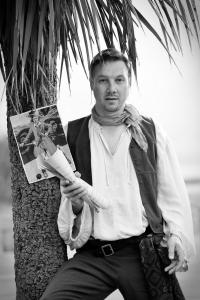
United Reformed Church, 13th July 2009
Pirates in the Caribbean is a 'dramatic song recital', a crossover between drama and music. Its creator Richard Parry brings to modern audiences art songs and ballads of the early 20th century (and some from much earlier) that would have been familiar to our grandparents but which are now 'dusty archaic manuscripts in second hand bookshops'. Richard has woven these songs into a dramatic adventure, a story of kidnap, pirates, treasure, love and abandonment. He aims to avoid the 'formal tension' which can spoil the enjoyment of song recitals and to attract audiences who wouldn't normally venture into the classical concert hall.
Richard shows his great versatility as a singer and actor, portraying all the characters in the drama from the laid-back, happy farmer's son 'leanin' on the gate beside the pond' extolling the pleasure of a 'little bit of straw to suck to keep your fanices mellow' to the munificent sailor turned inn keeper who's had a woman in every port and wishes them as much happiness as he's found now that he's married the 'widder from Monkey Town', to the furious pirate captain Timotheus, 'teeth glistening with gold among black decay', out for revenge. Will Taylor on piano gives a performance that echoes and enhances Richard's in style and mood, and integrates beautifully into the dramatic whole. Will shows his versatility too, doubling as sound effects man from time to time.
This isn't your common or garden afternoon recital. It's entertaining, and musically and dramatically engaging. A perfectly judged Fringe performance.
Last chances to see this concert: Sunday 19th and Saturday 25th July at 2.30 to 3.30 pm.
Barbara Wilson
PoWer Music Weekend - Prince of Wales
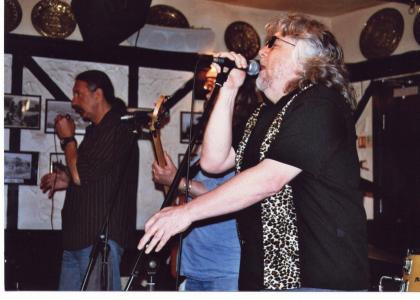
Prince of Wales Public House
A great evening at a lively venue, a cheerful place with a friendly landlord and good company from strangers.
Tonight (Friday) was the first night of the Power Music weekend in the Prince of Wales and we were treated to some quality music from 'Blues Train'. Although well known in the area, they have not played in Buxton for a while. Six musicians including lead (with occasional slide), rhythm and bass guitars, drummer, singer and Dennis, the harmonica player from Whaley Bridge who felt his way in and out of friendly and familiar blues harmonies.
There was a mix of locals and Fringe goers who were chilled out, sitting in front of pints with rocking heads and tapping feet. Within 15 minutes of their opening number there were half a dozen people dancing. Route 66, Tobacco Road and G.L.O.R.I.A. Good stuff!
There were two surprise guest appearances during the evening too! The first were an American couple who have been performing this week in the Poole's Cavern, 'Bright Cecilia'. Reg, the Blues Train singer spotted them across the room and at the end of the band's first session he invited them to sing one of their medieval numbers acappella. Beautiful voices enjoyed by 'most' of the pub's clientele.
For the first few numbers in the second session, there was a guest drummer, Bob from the Elkie Brookes Band.
The final weekend of the Fringe, the Prince of Wales is hosting a varied mix from local bands and musicians with changes to the published Fringe programme:
On Saturday afternoon (2pm - 4pm) is guitarist Will Hawthorne playing 60's with some Beatles and in the evening, from 9pm, is 'Fletch' playing 50's and 60's rock n' roll.
On Sunday afternoon (2pm - 4pm) a Fringe favourite 'Ruby Highway' with a mix of Blues and humour and finally on Sunday night, from 9pm, are the Lizards playing light rock.
A good pick n' mix of music (unless you are a c&w fan) in a great pub atmosphere.
Martin Wood
Project Adorno's Top Ten of Popular Culture - Project Adorno
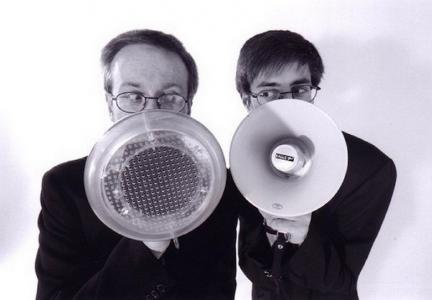
The Barrel Room, 18th and 19th July
I'm bound to begin by saying that I love what Project Adorno do and this was very much happy hour in the Barrel Room for me. Explaining why I like what I do may be a bit trickier.
Project Adorno sound a bit like the Pet Shop Boys - that sort of techno-pop with flattish vocals (though to be realistic PA don't sing terribly well, but that adds to the charm for me). Their songs or verses are not about the usual pop stuff - which is love, essentially. This year's show is on the theme of what Social Trends data tell us about what we - the British - like to do. It is a set of songs about lists, essentially.
So they kicked-off with a song about computer games from the 1980s - and the virtues of the Spectrum ZX as against the Commodore 64. Was it that long ago? This was swiftly followed by songs about top museum attractions (Natural History Museum by way of the Crystal Palace and the cards you might collect from packets of tea).
Other numbers - I use the term advisedly and correctly in this context of lists - were about how technological expansion had produced "a menu of meaningless choices"; the melancholy nature of the English pier; football culture (PA seemed admittedly out-of-their-depth here - according to The Times Rinus Michels was the greatest football manager ever but they didn't seem to know much about the great man).
Other stuff was about the virtues of reading - "not a bad habit to have"; "Woody Allen we appreciate your canon" - typical of their rhyming ingenuity; a song written and sung by the M25. One list strangely - but it did come from The Sun - listed the 10 sexiest male newsreaders without including Jeremy Paxman. Project Adorno put that omission to rights.
The finale included the chorus "I hear the sound of the world as it's falling apart, The disintegration of it's cold post-modern heart". All delivered with beaming smiles and the aid of laptop projections.
Marvellous. If you can't see why - well it's either your fault or mine. Don't blame Project Adorno.
Keith Savage
Sacred Medieval Singing in a Natural Cathedral - Bright Cecilia
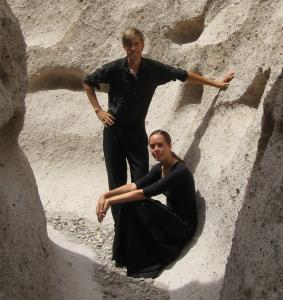
Poole's Cavern
Robin and Graham Bier are a wife and husband American couple. They have been studying early music at the University of York (with John Potter of the Hilliard Ensemble among others) and are planning to stay there for a further 3 years. They are already planning to return to Buxton next year. On the basis of their Fringe debut this is excellent news.
Bright Cecilia is a flexible unit and sometimes includes other voices and other musics (e.g. jazz). For this week, however, the focus is firmly on early sacred music. Although Robin and Graham have always been keen to explore a range of acoustic environments this is the first time that they have performed in a cave. This wet summer the river is flowing vigorously through the cave, which made it important to choose with care the sites for singing. It is one thing to have the dripping of water lending to the atmosphere; it is quite another matter to have a torrent carrying the music away.
By using just two voices there was bound to be a sinuous and flexible quality to the music and, as they explained, it is necessary to listen carefully to the delay in the cave and try to respond to that. Tonight's programme was a mixture of lamentations from sacred drama (one by Hildegard of Bingen) - sung in chant with alternating voices - and lauda, polyphonic songs of praise.
The staging was simple but very effective. Robin and Graham adopted a series of poses influenced by images seen in church stained glass windows of religious frescoes. With faces lit by single lights from their music folders the emotional impact of the music was heightened.
Robin and Graham are performing two different programmes on alternate nights. On the 23rd and 25th they will be singing a number of movements from different masses some of which grew out of popular melodies such as Dufay's L'homme armee. This is a rare opportunity to hear two fine voices in such an environment creating something that is special - grab it while you can.
Keith Savage
Sam Dunkley - Sam Dunkley
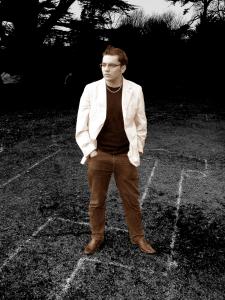
Underground Venues - 18th, 19th, 24th, 25th July at 5:30pm
In his own words, Sam Dunkley "sings songs and talks a bit", but he does them both very, very well. Tonight in the Barrel Room he was on top form as he took us through a set of some of his own songs interspersed with old favourites. The easy charm of Sam's patter is a big part of his appeal, and why so many people return to see him each year, and whether he's encouraging us to boo if things go wrong or gamely accepting curve-ball requests, the audience lapped it up.
Throughout Sam is effortlessly engaging and though self-deprecating about his own musicianship, he played keyboards, guitar and Turkish drum (on a proper English folk song) with assurance. His ability to inhabit a song enables him to slip seamlessly from bantering with the audience to a moving performance of a song such as the Irish folk song 'The Galway Shawl'. Other highlights included his own song, 'Life got in the way', and a memorable 'Hallelujah' to close.
Introducing a song he had written with children for St George's Day, Sam told of how he fell foul of the Daily Mail, Ann Widdecombe, and the England's-going-to-the-dogs brigade earlier this year. Sam's telling of the story and the abuse he received will make your night out.
Sam Dunkley is a gifted performer; he has the knack of creating an easy rapport with an audience immediately he comes to the stage. It is a natural ability and it is a joy to see him in action. Do go and see this show, I can't see how you wouldn't enjoy it. Unless you're Ann Widdecombe, I suppose.
Steve Walker
Seachanges - Susie Self and Michael Christie
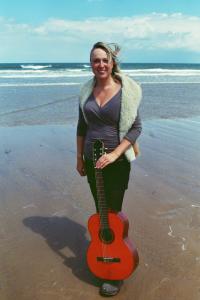
Buxton Methodist Church, 19th July 2009
Seachanges is an enchanting programme of songs written and performed by Susie Self with cellist Michael Christie. The songs tell of the sea and tides, water and weather, love, life and eternity. They reflect Susie's classical training, and her extensive travels and interest in the music of other cultures.
The concert opened with 'My lover said to me/ Come sail on the deep dark sea', an atmospheric number sung to the charming accompaniment of a wind chime. The simple lyrics and the use of much wordless singing were also to feature in many of the other numbers in the programme.
We were encouraged to let the sound wash over us for the following set of three songs. In the first, the moon rose over the sea, with Susie's voice and guitar evoking the pathway the light of the moon strikes across the surface of the sea. The second spoke of a lonely, worried heart reaching across the water, with Michael's cello suggestive of the deep underlying, eternal cadences and rhythms. The third was an improvisation on the sheela-na-gig, an enigmatic figure featuring in many Irish churches, a piece I believe was meant to suggest allure but also danger.
A number of songs featured beautiful orchestral backing from Susie's Seachanges album. Combined with the rich fullness of her voice 'Eastern Darkness', for example, captured the moment when the sun rises full and red and glorious over the horizon. Other pieces took their inspiration from poets: 'The Seeker Song' set to music the words of Canadian poet and artist Emily Carr and evoked the "rain dripping softly", the "weight of the wet" and the power of water to soothe.
Susie used to lovely effect a collection of exotic instruments. For example, the Tibetan Singing Bowl capable of many different harmonies was coupled with overtones produced by Susie ("the playing of her mouth like a flute") to perform the haunting 'The Whale Song'.
The final set of three numbers underlined the spiritual message of Seachanges: how life finds meaning in ever-flowing waters and in the elemental power of the tides. It closed with a joyful love song that recalled for me Dylan Thomas' "And I sang in my chains like the sea."
What a pity there was only one chance to hear this beautiful concert, and that the heavy rain no doubt put people off taking that one opportunity. The original intention was to put on three performances but an understudy offer at Glyndebourne meant that Susie had to cancel the first two. I hope she and Michael return with it to next year's Fringe.
Barbara Wilson
Song and String - Liath Hollins
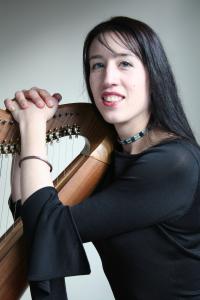
Underground Venues 19, 22-24 July
Liath Hollins performs a musical set as a soloist, singing traditional songs and playing a mix of traditional and more modern tunes, as well as accompanying herself, on the harp.
There are a few folk songs in there, but as Liath Hollins is keen to point out this is an "evolving tradition" and she opened with an air written by a friend 5 years ago (although I felt her statement that it sounded like an ancient tune did a little disservice to the relatively innovative composition). And the harp itself is not a folk instrument, generally limited to courtly/wealthy environments in the olden days and too limited in volume to compete at modern folk sessions.
The harp is a wonderful instrument, and rarely sounds dull or offensive. Liath's playing was particularly strong on the contrapuntal melodies and most fluent when she was accompanying her own singing. The selections of songs was diverse and covered all of the countries in the British Isles, striking a balance between the well-known and the obscure.
A very pleasant and relaxing concert.
Nick Butterley
Strings and Oboe - Bright String Trio with Simon Beesley
United Reform Church
It is great to welcome a new ensemble to the Fringe. The Bright String Trio actually consists of musicians, Nicola Bright (violin), Mary Anderson (viola) and Mary Dainton ('cello), who are well known in Buxton as they play for other groups appearing on the Fringe. They were joined in this concert by Simon Beesley (oboe) fresh from playing for the Buxton Musical Society in the Haydn mass at St John's in the morning.
An interesting programme opened with Beethoven's C minor string trio. Haydn had advised Beethoven not to compose in C minor, advice which Beethoven ignored - thank goodness! This was followed by Britten's Phantasy opus 2. This is an oboe quartet written by Britten when he was nineteen. There must have been some revision of Briitten's opus numbers because his pushy mother claimed that her talented son had already reached opus 100 at the age of fourteen. Be that as it may although an early work it points the way in which Britten would mature in the future..
The inclusion of Finzi's Prelude and Fugue for string trio had promted many Finzi fans to attend. And they were not disappointed. Finzi sits firmly in the English pastoral tradition and his haunting music conjures up the English countryside but tinged with melancholy.
The concert concluded with Mozart's well known quartet for oboe and strings K 370. Written when Mozart was visiting Munich in 1781 it is almost a chamber concerto for oboe. and it makes quite significant demands on the soloist. Happily Simon was completely secure and the result was a delight.
The URC is a fine venue for this kind of concert. The space is not too large, the acoustic is just about perfect and - a bonus on a cold and wet summer's evening in Buxton - it was comfortably warm!
Peter Low
The Life and Times of Antigua Joe - Solo Artist/Poet/Story-teller
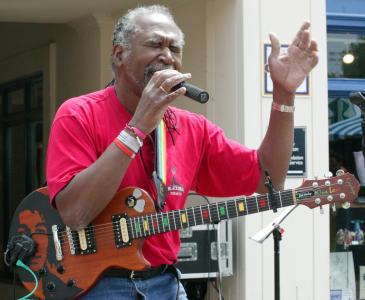
The Grove Hotel
Antigua Joe, resident in Britain since 1971, gave us a show based upon his experiences. Not always in Britain, and not always funny, but one feels, always honest.
Joe was last in Buxton 11 years ago and has had chance to add to his material. The evening was a mixture of anecdotes, poetry and song which could best be summed up as a show of two halves.
In the first half there were stories about Joe and his family, growing up in loving family, moving to Britain and the benefit of 5 years in the RAF (not for everyone I fear). Stories of girlfriends good and bad, of Carnival and of life and death itself. Joe gave us poems Levi Tafari and his own compositions about the experience of being Melanin rich in Britain.
The second half was largely given over to music, with Joe giving us renditions of some well-known and some not so well-known (including a Lord Tanamo cover for you ska fiends) Caribbean tunes. There was calypso, reggae and soca to keep your foot tapping.
Personally, I preferred the first half, and would liked to have heard more of what has it seems, been an interesting life so far. The rest of the audience didn't appear to agree as they sang along, but hey, that's show business!
Ian Heath
The Tideswell Male Voice Choir in Concert - Tideswell Male Voice Choir
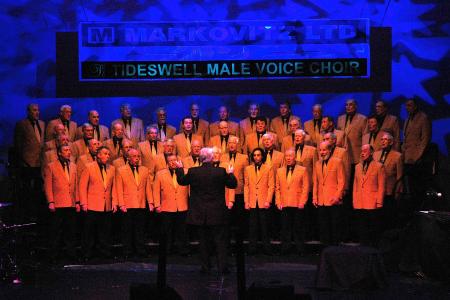
Tuesday 14 July
I'll start with a confession: this would not usually have been my first choice concert. But having heard them performing on the Prom on Fringe Sunday, I was happy to step in as a last minute reviewer.
And I was not disappointed. The first half was a little low key for my liking with the choir showing great control in their collective singing in a range of music from sacred - God's Choir and the Lord Is My Shepherd - to pop including Westlife's You Raise Me Up and Bette Midler's The Rose, ending with Any Dream Will Do from Joseph.
The second half saw the choir step up a gear as they swung into two Frank Sinatra numbers, New York, New York and My Way, before moving on to American Trilogy. All of which gave them the chance to really open up to good effect.
The choir closed the concert - fittingly on Bastille Day - with a medley from Les Miserables, including a sensitive solo from Maurice Hargreaves in Bring Him Home.
However, a special mention must be given to 18-year-old bass baritone Tyler Cooper, for two wonderful solos: Empty Chairs and Empty Tables, and, Stars. It was no surprise to learn that he is due to go to the Royal Northern College of Music next year - but on a long lead, back to Tideswell!
Another 'find' for the choir is accompanist Christopher Ellis who stunned the audience with his performances of the first of four ballades by Chopin and a scintillating rendition of Earl Wild's transcription of the Introduction and Summertime from Gershwin's Fantasy on Porgy and Bess. Both played from memory.
He is appearing on the Fringe again on Wednesday 22 July with baritone Nicholas Bennett in A Way With Words, an evening of great poetry in song.
Throughout the concert, from the quietest numbers to the loudest, the choir's control and power was evident - personally, I would have liked to have heard a little more variety, and a bit more of the power they so obviously possess.
In my experience, choral directors and conductors have a bit of a reputation for being dragons. Dennis Kay is not one of them, he is generous and nurturing and this clearly brings out the best in the choir. He is happy to share the limelight with soloists, musicians and his very able deputy conductor Eileen Rigg, with a nice line in patter as he introduced every item.
Most importantly he is very willing to promote young talent such as Tyler and Christopher, and drummer Daniel Hopkins (16). As he rightly says these are the future of Tideswell Male Voice Choir, it is good to know that they are already working with Hope Valley College to attract more young men to singing.
Although not strictly part of the Fringe, the choir can be heard again, this time on their home turf in their Annual Concert in Tideswell Parish Church on Saturday 25 July.
Caitlin Bisknell
Youth Orchestra and Youth Chorale Concert - Derbyshire City and County Music Partnership
17th July, Octagon
This was the showcase finale to the Summer Course for the Derbyshire Youth Orchestra - both they and their audience were huge in numbers! And apparently they only got the music 5 days ago! They shared the stage with the recently formed Youth Chorale who will attend their own residential course soon.
The opener was the well loved Hansel and Gretel Overture. Peaceful forest sounds leading to soaring climaxes and overall it made a very pleasant start to the evening.
Next up was the choir who sang four short pieces. Quite a range from African call-and-response, the lovely BlueBird ballad (with soprano solo from Frances Gregory) with such a delicate balance, and a quite lively Chilcott 'boogie' spiritual. Overall they made a satisfying blended sound.
The centrepiece of the concert was the evocative Concierto de Aranjuez by Rodrigo with guitar soloist James Rippingdale. James is also playing solo recitals around the area on the Fringe (you can still catch him at St Peter's on the 18th and Buxton Methodist on the 20th) and has made quite an impression on the scene since graduating in 2001. He is clearly a very talented, but modest musician, a master of his instrument making the concerto (played from memory) effortless and controlled.
The well known Adagio opened with simple guitar chords accompanying a beautifully played cor anglais solo (Rees Webster) - the latter with exquisite phrasing and rubato. The guitar cadenza was both awesome and flawless - what a feast. The gentle Allegro ended this wonderful concerto - the final movement having a complex , but delicate rhythm throughout in keeping with Rodrigo's suggestion that the concerto "should only be as strong as a butterfly....a suggestion of times past." Lovely.
Considering that the students only saw the music five days ago, tackling the monster score of Bernstein's Symphonic Dances from "West Side Story" might seem ambitious - but not for the cream of Derbyshire's orchestral talent. The suite is arranged from the full "West Side" show score and contains all the best bits including Somewhere, Cool, Cha Cha and the great jazz riffs and mayhem of the Mambo and Rumble. The DCCYO did not disappoint. Their Somewhere - with its gorgeous cello and horn solos - was something else! In Mambo, all the strings stood up on queue to shout 'Mambo!' (quite a sight) and Cool was just a fantastic rock jazz jam for full orchestra - amazing!
If you missed them, sorry, this was a one off - but do look out for them next year, and remember James Rippingdale is still on the Fringe this year.
Martin Bisknell